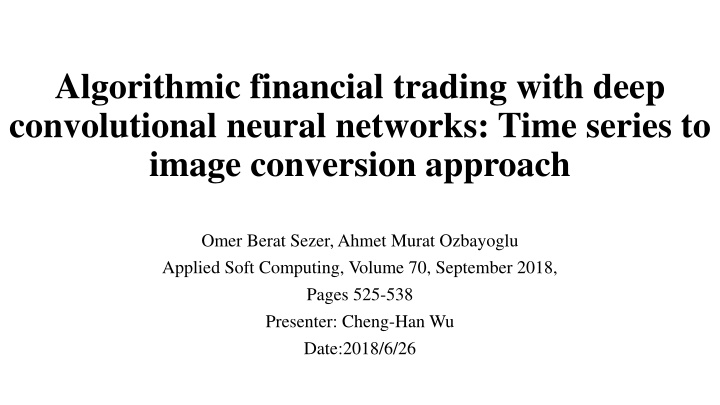
Algorithmic Financial Trading with Deep Convolutional Neural Networks
Explore the innovative approach of using deep convolutional neural networks for algorithmic financial trading. The study proposes a model, CNN-TA, that converts financial time series data into 2-D images for improved trading strategies. By leveraging computational intelligence and deep learning models, the research demonstrates superior results compared to conventional trading systems. Find out how technical indicators are utilized to generate data and how images are labeled as Buy, Sell, or Hold based on market trends.
Download Presentation

Please find below an Image/Link to download the presentation.
The content on the website is provided AS IS for your information and personal use only. It may not be sold, licensed, or shared on other websites without obtaining consent from the author. If you encounter any issues during the download, it is possible that the publisher has removed the file from their server.
You are allowed to download the files provided on this website for personal or commercial use, subject to the condition that they are used lawfully. All files are the property of their respective owners.
The content on the website is provided AS IS for your information and personal use only. It may not be sold, licensed, or shared on other websites without obtaining consent from the author.
E N D
Presentation Transcript
Algorithmic financial trading with deep convolutional neural networks: Time series to image conversion approach Omer Berat Sezer, Ahmet Murat Ozbayoglu Applied Soft Computing, Volume 70, September 2018, Pages 525-538 Presenter: Cheng-Han Wu Date:2018/6/26
Abstract(1/2) Computational intelligence techniques for financial trading systems have always been quite popular. In the last decade, deep learning models start getting more attention, especially within the image processing community. In this study, we propose a novel algorithmic trading model CNN-TA using a 2-D convolutional neural network based on image processing properties. In order to convert financial time series into 2-D images, 15 different technical indicators each with different parameter selections are utilized. Each indicator instance generates data for a 15 day period.
Abstract(2/2) As a result, 15 15 sized 2-D images are constructed. Each image is then labeled as Buy, Sell or Hold depending on the hills and valleys of the original time series. The results indicate that when compared with the Buy & Hold Strategy and other common trading systems over a long out-of- sample period, the trained model provides better results for stocks and ETFs.
Data Dow 30 index
Feature select (1/2) Relative Strength Index (RSI) Williams %R Simple moving average (SMA) Exponential moving average (EMA) Weighted moving average (WMA) Hull moving average (HMA) Triple exponential moving average Commodity Channel Index (CCI) Chande momentum oscilator indicator (CMO)
Feature select (2/2) Moving average convergence and divergence (MACD) Percentage price oscillator (PPO) Rate of change (ROC) Chaikin money flow indicator (CMFI) Directional movement indicator (DMI) Parabolic SAR 2002/1/1/ to 2017/1/1 (testing : 2007/1/1 to 2017/1/1) 2002/1/1/ to 2012/1/1 (testing : 2007/1/1 to 2012/1/1)
Feature Image 6-20 days of each indicators 15x15
Labeling 11 11 If min SELL Elif max BUY Else HOLD 11 11
CNN ? ? = ? ? ? = ?= ? ? ?(? ?) ? ?,? = ? ? ?,? = ? ?? ?,? ?(? ?,? ?) ??= ???,???+ ?? ? = ???????(?)
ETF analysis Transaction cost 0.01%
